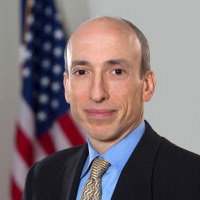Grayscale Investments, the digital currency asset manager, has hired a global head of exchange-traded funds even though the US Securities and Exchange Commission has not approved a Bitcoin ETF.
The firm said in a statement that it has hired David LaValle as senior managing director, global head of ETFs, reporting directly to Michael Sonnenshein, chief executive of Grayscale.
Sonnenshein said in a statement that Grayscale is 100% committed to converting its investment products, including Grayscale Bitcoin Trust (GBTC), into ETFs,
“Dave will accelerate Grayscale’s ability to realize our commitment to ETFs, and I couldn’t be more excited to welcome him to the Grayscale team, and the digital asset ecosystem, more broadly,” added Sonnenshein.
Prevously LaValle was chief executive of Alerian and S-Network Global Indexes, an independent index provider. He also previously served as the US Head of SPDR ETF Capital Markets and as a member of the senior leadership team at State Street Global Advisors. Prior to State Street, LaValle led Nasdaq’s exchange-traded product marketplace where he was responsible for all aspects of strategy and business development for Nasdaq’s ETP listing and trading businesses.
LaValle said in a statement: “There’s been a fundamental shift in investor preferences, directly impacting wealth managers and the asset management industry. I’m delighted by the opportunity to leverage my broad experience to work with Michael and the Grayscale team to advance this digital evolution.”
The US Securities and Exchange has not approved any of the filings made for Bitcoin ETFs, even though they have been authorised in other jurisdictions.
Gary Gensler, the new chair of the SEC, said in a speech on 3 August that investment vehicles providing exposure to crypto assets exist, with the largest among them having been around for eight years and worth more than $20bn.
Gensler also highlighted that some mutual funds invest in Bitcoin futures traded on CME. He anticipates there will be filings for ETFs under the Investment Company Act (’40 Act).
“When combined with the other federal securities laws, the ’40 Act provides significant investor protections,” Gensler added. “Given these important protections, I look forward to the staff’s review of such filings, particularly if those are limited to these CME-traded Bitcoin futures.”
Sonnenshein said in his CEO mid-year investor letter that the firm was eager to see the crypto ecosystem reach a point of maturation to give U.S. regulators and policymakers the requisite comfort to approve digital currency ETFs, though timelines remain uncertain.
In July this year Greyscale engaged BNY Mellon as part of its commitment to convert Grayscale Bitcoin Trust into an ETF. BNY Mellon has been hired as an asset servicing provider for GBTC and will provide fund accounting and administration effective from October. Grayscale also anticipates that BNY Mellon will provide transfer agency and ETF Services for the Grayscale Bitcoin Trust upon its conversion to an ETF.
BNY’s proprietary ETF Center offers technology designed to support digital asset ETFs.
Roman Regelman,chief executive of asset servicing and head of digital at BNY Mellon said in a statement: “It’s another critical milestone in our rapidly growing digital asset capabilities and broader strategy of putting client choice at the center of everything we do.”
In the same month Grayscale said the SEC registration statement for its Grayscale Digital Large Cap Fund had become effective and that the asset manager had publicly filed more registration statements in order to increase disclosures.
Craig Salm, vice president of legal at Grayscale Investments, said in a statement: “Events such as the Fund becoming our third SEC reporting company, and the additional Form 10 filings, signal that there is continued investor interest in gaining exposure to the growing digital currency ecosystem within existing regulatory frameworks, and that regulators continue to engage with market participants in the asset class.”
Regulation
Gensler said in his speech that the SEC’s core mission is investor protection.

“Right now, we just don’t have enough investor protection in crypto,” he added. “Frankly, at this time, it’s more like the Wild West. This asset class is rife with fraud, scams, and abuse in certain applications. There’s a great deal of hype and spin about how crypto assets work. In many cases, investors aren’t able to get rigorous, balanced, and complete information.”
He continued that there are some gaps in regulation and regulators need additional Congressional authorities to prevent transactions, products, and platforms from falling between regulatory cracks.
“In my view, the legislative priority should center on crypto trading, lending, and DeFi platforms,” Gensler said. “Regulators would benefit from additional plenary authority to write rules for and attach guardrails to crypto trading and lending.”
Nigel Green, chief executive and founder of deVere Group, said in an email that the demands by the SEC underscore that cryptocurrencies are a major growth market and are gaining further influence within the mainstream global financial system.
“Gensler’s calls for the SEC to be given more direct authority over the burgeoning crypto sector will, I believe, be approved by Congress,” added Green. “This is a threshold moment as it shows that the time has come to hold crypto assets to the same standards as the rest of the financial system.
Green continued that the shake-up will likely generate some market turbulence, but ultimately regulation will help protect both retail and institutional investors, help combat cryptocurrency criminality, and reduce the potential threat of disrupting global financial stability, as well as offering a possible long-term economic boost.



